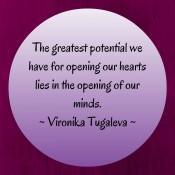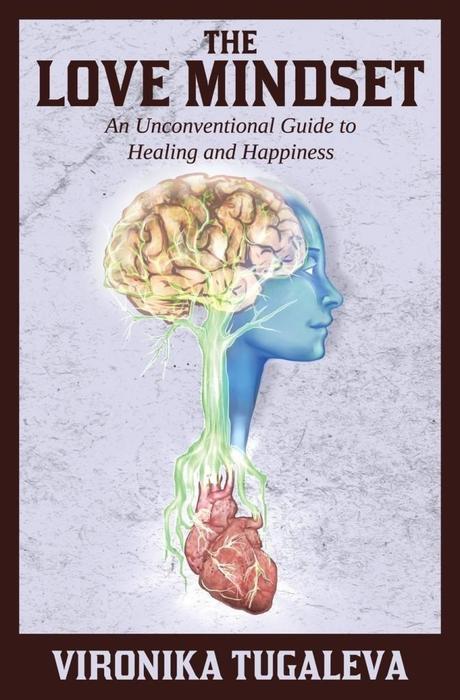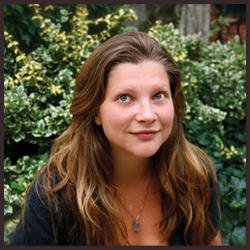
The Love Mindset – An Unconventional Guide to Healing and Happiness by Vironika Tugaleva is about her journey from self hate – something all of us go through at one time or other – to self love, something most of us take a long time to achieve. The turning point is finding the love we so desperately need to survive.
Written in lucid, conversational style The Love Mindset convinces you that love heals all wounds. I personally believe this – although I did not always believe it. Experience is a good teacher, and the author, Vironika shares her own journey of spiritual awakening after a decade long mental health crisis.
The Love Mindset – a book written from the heart.
As you turn the pages and read the words you may see yourself reflected in them, experiencing again, those feelings you never acknowledged or were too afraid to. Only this time, you’ll find yourself emerging victorious, overcoming whatever held you back from healing yourself.
Through The Love Mindset, Vironika guides us through the process of finding and keeping love and happiness in our lives. She urges us to awaken to our inner strength. Why try to be someone you aren’t?
The best message from the book is this: the power of love and using it to find ourselves. The love mindset is like a compass that always points to love. If you’ve struggled with the pain of isolation, loneliness, and self-destruction this book will help you heal.
No matter how much you cry, the tears will dry.
Love heals all wounds.

I enjoyed Vironika’s analogies throughout the book. Here is a beautiful passage from The Love Mindset
There is a popular and dangerous myth out there that speaks of love scarcity. This myth tells us that there’s not enough love to go around for everyone. It’s almost as if life is a giant buffet and love is the favorite dish of all the people. Everyone lines up, but only the first in line gets her fair share. Everyone else either gets scraps or gets turned away. The doling out of love is said to be a matter of being lucky enough to get it at the right moment with the right person. This is exactly why people throw themselves at married, unavailable, or violent people. They get a glimpse of love and they fear that it’s the only scrap they’ll ever get, so they hold on with all their might.
Love is more abundant than we could possibly imagine. Just like there is more air than we could possibly breathe in, there is more love than we could possibly perceive. There is no risk of running out of love. There is no limit on love. The only limits are of our perception, our awareness. The only risk is of being closed off to love and living a life of failing to perceive it.
I have permission to share an excerpt from the book with you and here’s what I chose. Enjoy!
“Who you really are“
Self is the only prison that can ever bind the soul.
Henry Van Dyke
Of all thoughts that we’ve ever experienced, the “I” thought has been, by far, the most long-standing and the most influential on our mindset. Of all the roots that we have, the root of our own identity burrows the deepest. It all started with the first “I am” thought. “I am Vironika.” “I am Peter.”
It all begins quite innocently with just a name. As we grow, the thought strengthens. “I really am Vironika!” The thought gives me comfort. I know that this is what I am called. Each time I am called this, I respond, and there is someone waiting to attend to me. I feel safe knowing that I am Vironika and not something or someone else. The comfort of identity is our first solidifying belief.
Over time, other “I” thoughts get fed to our roots and we soak them up readily. When we’re children, we soak up anything and everything we’re given. If I am told that I am a girl and, because of that, I like dolls, then I will say I like dolls. If I’m told that I’m not good at sports, then I’ll say I’m not good at sports. I trust others to tell me who I am. I also want desperately to know who I am. I want to formulate a permanent identity, a core self. I deeply desire to have certainty about myself. In this desire, I take whatever I’m given without discriminating whether or not it is true. I have no idea what is true and what is not. I just eat the thoughts, all the “You are” statements, and turn them into “I am” statements. These all gather up and, over time, I use them as my identity.
Then, quite suddenly, comes the identity crisis. Multiple times in a person’s life, his definition and understanding of his own self comes under the harsh light of self-examination. One such time is in adolescence. The identity that forms solidly and quickly in childhood is fueled only by the opinions of family. You are Sam. You are Pam. You are good. You are bad. You are smart. You are dumb. You are funny. You are a pain.
In adolescence, our awareness is jolted by a new motivation: the desire for peer approval. This poses a challenge to our current identity because, thus far, we’ve only needed to impress our parents. Suddenly, I can no longer be who I was. I must find a way to be myself in a way that matches who my peers want me to be.
Another time when identity is called into question is when major relationships dissolve. All of a sudden, a connection is fractured. Suddenly, that part of my identity, my identity as your partner, is gone. Then, it is time to find a new identity. Now, I must find out who I am apart from what I was to you. This also happens in times of healing, recovery, and crisis.
When we face monumental changes in our behaviours, environments, or social groups, there is a moment of exposure, of suddenly looking at ourselves. Any change in routine, whether it’s a death in the family or a decision to quit smoking, jolts our awareness out of its automatic functioning. When our stable patterns of behavior are interrupted, our mind is interrupted also. Our thoughts are cruising on auto-pilot when, suddenly, we remember that there’s a switchboard.
Likely, you’ve faced such an identity crisis. Likely, you’ve faced it more than once. You’ve looked at yourself, literally or figuratively, and thought – do I really want this? Am I really that kind of person? Does this really make me happy? What do I really want? Who is this looking back at me? Why am I here? Am I supposed to do this? Am I supposed to feel this way all the time? Is this really important to me? What is important to me?
Questions about identity are often painful. The mind is directing us effortlessly in some direction and, suddenly, we’re shocked by the sudden loss of certainty. It’s like driving somewhere for four hours and suddenly realizing that you’ve gone north when you should have gone south. Except it hasn’t been four hours, it’s been a quarter or half a century.
Identity questions immediately arouse feelings of regret, shame, anxiety, panic, guilt, and helplessness. For this reason, most people either ignore them or they segue immediately into some new identity. The first group is dissatisfied immediately and the second is dissatisfied later when the identity crisis inevitably arises once again. When we push the identity crisis away enough times, it stops bothering us quite as much. We no longer panic about our lack of self-respect and our deprivation of love. After all, one can get used to anything, even dying.
These moments of self-questioning, however, are prime opportunities to discover the love mindset. They are times when, instead of switching from one socially imposed identity to another, we can take a good look at ourselves and find out, once and for all, who we really are.
♥
About the author

Vironika Tugaleva
Vironika Tugaleva is an author, speaker, people lover, reformed cynic, and a different kind of spiritual teacher. She helps people heal their minds and discover their inner strength. Read more about Vironika and her inspiring book The Love Mindset
Connect with Vironika on Facebook and Twitter
Do I recommend the book? Yes, I do!
Buy it on Amazon
(Affiliate link. Earnings if any, are donated to charity)
Namaste!
I am glad you are here. May your day be filled with smiles!
For a regular dose of happiness, subscribe via RSS in your feed reader
or get updates in your email inbox

